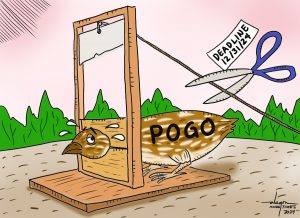By Herman M. Lagon
IN THE wake of the New Year, as Western Visayas plunged into darkness, the Ilonggos faced an unexpected challenge. From 2 p.m. on January 2 until the day after (and probably days after next), a significant power outage swept through the area, leaving many in the heat and darkness. Yet, in these testing times, the people showcased a remarkable spirit of resilience and humor, turning to social media to share their coping mechanisms and lighthearted commentaries.
The total blackout in the islands of Panay, Guimaras, and a part of Negros was a stark reminder of our dependency on electricity. However, it also revealed the enduring spirit of the Ilonggos. Amidst the inconvenience and discomfort, they found a way to laugh, highlighting their adaptability and creativity.
As a former Physics teacher at a Jesuit school in Iloilo City, I recall dividing my students into groups, each adopting and debating over a different power source for study. This early 2000s exercise, part of my grad research, remains relevant today, as evidenced by the social media posts during the blackout. My former students in their pockets of reunions or GCs somehow still discuss these energy sources, highlighting their continued significance.
The humor of the Ilonggos was evident in the myriad of memes and posts on Facebook, Twitter, and Instagram, from my post about a solitary meal at Sgt. Bob in Barotac Nuevo, captioned “Lonelier, the darker table just for one,” to witty remarks about the inconvenience of the outage; the humor was a coping mechanism in itself.
One user humorously noted the paradox of some people who complain first about the delay in the restoration of electricity despite illegally tapping into the power line as “jumpers.” He said: “Imagine! Ga jumper ka lang pero ikaw pa una rant kay dugay mag siga. Dabest!” Another wryly observed that the intermittent, rationing return of power felt like a mix of an early Christmas when electricity is up and All Souls Day when the line is down again. Complaints about the inability to properly celebrate the festive holiday season due to the blackout were common, reflecting a mixture of frustration and humor.
The impact of the blackout extended to various aspects of life in Western Visayas. A DepEd official humorously lamented the lack of water in offices and the consequent hygiene issues (ubusay na water sa ofis… mabaho na! May chance ayhan mag power today sa city proper? Sabat…”). An online worker joked about the challenges of working from home during a blackout, while another post counted the hours of power outage in the metropolis. A lawyer sarcastically hanked a deity for a brief respite of sleep, criticizing the National Grid Corporation of the Philippines (NGCP) for searching for a scapegoat, akin to their actions in April 2023.
The humor took a more risqué turn with jokes about the unavailability of motel rooms, likening the situation to the February 14 spree, “Daw Valentine’s Day lang ba. Wala bakante mga motel!” Some are asking if study hubs or working spaces are available at night as an alternative. Some others are saying that they are virtually useless in the office if power is out. The frustration with the electric cooperative’s spelling was expressed humorously, and questions were raised about the synchronization of power plants with the grid. Amidst the outage, some sought to find a silver lining, gratefully noting that at least there was no blackout during Christmas and New Year’s Eve.
As businesses and individuals struggled with the prolonged outage, the impact on daily life was profound. A public employee expressed agitation at the inequity of the situation, noting how the blackout disproportionately affected laborers who, after a hard day’s work, could not even enjoy the basic comfort of a fan. The situation was tough for those living hand-to-mouth, for whom the blackout meant a loss of income and added hardship in feeding their families.
In one of my recent Facebook posts, I reflected on this situation: “It is a sorry state of affairs when businesses start to boast about having electricity as if it’s a luxury service or marketing edge.” Additionally, I remarked, “Looks like the power’s embracing the new year with a blackout—a shocking, perspiring, and riveting start to 2024!”
In this context, the resilience and humor of the Ilonggos were not just a means of coping but a reflection of their spirit. Despite the outrage and discomfort, many have seen the light in the darkness, finding hope in despair and laughter amidst adversity. This resilience, as opposed to toxic positivity, is a testament to the Filipino spirit, particularly the Ilonggos’, who can find humor and strength even in the bleakest times.
The Western Visayas blackout of January 2024 serves as a reminder of the importance of reliable energy infrastructure. It highlights the energy crisis and the need for sustainable and stable power sources, a topic that has been relevant since the early debates of my teaching days. As we move forward, it is crucial to address these issues, ensuring that such outages do not recur and that the lighthearted resilience of the Ilonggos is a choice, not a necessity.
***
Doc H fondly describes himself as a ‘student of and for life’ who, like many others, aspires to a life-giving and why-driven world that is grounded in social justice and the pursuit of happiness. His views herewith do not necessarily reflect those of the institutions he is employed or connected with.


